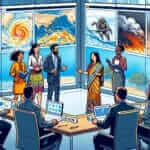The IELTS Reading section assesses a candidate’s ability to read and understand various types of texts. The topics covered can range from science and technology to social issues. One recurring topic, relevant and timely, is the impact of social media on interpersonal communication. Given the omnipresence of social media in contemporary life, understanding its effects is crucial.
In the past, IELTS exams have frequently featured articles related to technology and social interactions, making it a prevalent theme. Given the importance and recency of the subject, it is highly plausible that future IELTS exams may present similar topics.
Reading Passage: The Effects of Social Media on Interpersonal Communication (Medium Text)
In today’s digital age, social media has revolutionized the way individuals communicate. Platforms like Facebook, Twitter, and Instagram have become ubiquitous, shaping interactions and relationships.
The Positive Effects of Social Media:
Social media allows people to stay connected irrespective of geographical barriers. It enables instant communication, making it easier to maintain relationships with friends and family across the globe. Moreover, social media fosters the development of online communities where individuals can find support and share interests.
The Negative Effects of Social Media:
Despite its advantages, social media poses significant challenges to interpersonal communication. Over-reliance on digital interactions can reduce face-to-face contact, leading to weakened social bonds. Moreover, the curated nature of social media profiles can create unrealistic expectations and lead to feelings of inadequacy and envy.
Implications on Social Skills:
An over-dependence on social media can impede the development of essential social skills. For young people, who are in crucial stages of social development, this can result in difficulties in real-life interactions. Studies have shown that excessive use of social media correlates with increased feelings of loneliness and depression.
Conclusion:
While social media has indeed revolutionized communication, it is essential to balance online interactions with traditional face-to-face communication. Awareness and moderation are key to mitigating the negative effects while harnessing the positives.
 Social Media Interaction
Social Media Interaction
Sample Questions and Answers
Multiple Choice Questions
1. What is one positive effect of social media according to the passage?
- A. It reduces the need for face-to-face interactions.
- B. It allows instant communication across geographical barriers.
- C. It ensures privacy in communications.
- D. It reduces feelings of loneliness.
Answer: B. It allows instant communication across geographical barriers.
2. What negative effect of social media is highlighted in the passage?
- A. It eliminates the need for telephone communication.
- B. It causes geographical isolation.
- C. It can lead to feelings of inadequacy and envy.
- D. It makes people more sociable.
Answer: C. It can lead to feelings of inadequacy and envy.
True/False/Not Given
3. Social media has only positive effects on communication.
Answer: False
4. Studies have shown a direct correlation between the use of social media and an increase in feelings of loneliness.
Answer: True
Sentence Completion
5. Excessive use of social media can impede the development of essential __.
Answer: social skills
Answer Key Explanation
Multiple Choice Questions
-
Answer: B – The passage explicitly states that one of the advantages of social media is enabling instant communication across geographical barriers.
-
Answer: C – The passage mentions that the curated nature of social media profiles can lead to unrealistic expectations and feelings of inadequacy and envy.
True/False/Not Given
-
Answer: False – The passage discusses both positive and negative effects of social media on communication.
-
Answer: True – The passage mentions studies that have shown a correlation between excessive use of social media and increased feelings of loneliness.
Sentence Completion
- Answer: social skills – The passage states that an over-dependence on social media can impede the development of essential social skills.
Common Mistakes
- Misinterpreting the text: Always ensure you understand the context fully before answering.
- Ignoring keywords: Pay attention to keywords in the question and locate them in the passage.
Vocabulary
- Ubiquitous (adjective, /juːˈbɪkwɪtəs/) – Present, appearing, or found everywhere.
- Curated (adjective, /kjʊˈreɪtɪd/) – Select, organize, and look after items.
- Impedance (noun, /ɪmˈpiːdəns/) – Hindering or obstructing the process.
Grammar Highlight
- Correlative Conjunctions: “Both…and, either…or, neither…nor” are used to connect grammatically equal elements.
- Example: “Both social media and traditional interactions are important.”
Final Advice
To excel in the IELTS Reading section, practice regularly with diverse topics such as social media’s effects on communication. Develop strategies to quickly identify keywords and understand the passage’s main ideas. Balance your online and offline reading to keep your skills well-rounded. For further reading on related topics, visit our articles on social implications of virtual communication, technology’s influence on family dynamics, and technology’s impact on human interaction.


